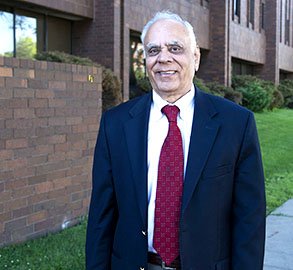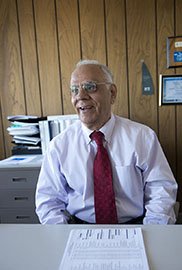Alumni Profile: Naeem Qureshi

He landed in the United States with $21 in his pocket. He had left his mother, his wife, and his child in Pakistan. That was December 1973. Today, Naeem Qureshi, PE, is the President of Progressive Consulting Engineers, Inc. Qureshi talks about his experience and passion for helping others.
Naeem Qureshi (MCE, 1985) grew up in Pakistan. After graduating, he worked for an American company in Pakistan. When their contract ended, he got a job teaching at the University of Engineering and Technology. He came to feel he needed a master’s degree to move ahead.
His mother, educated only through 6th grade herself, believed strongly that education was necessary for progress. She agreed that he should go to the US to complete his degree. His mother’s belief in education shaped Qureshi’s commitment and proved to be a strong motivator.
“When I went to the University, I found out how long it would take me to get a master’s degree. I had come to Minnesota because my brother was here; he had come in 1955. He graduated from UMN, completing his Master’s in Civil Engineering in only 9 months, so that was my expectation. I thought of my wife and baby back in Pakistan. I had no money. I had to look for a job.
“Job hunting was one of my first encounters with cultural differences. I quickly got my first interview. The guy said come for an interview at 4:00 PM at the Community State Bank Building at 9726 Lyndale Avenue South. In Pakistan, all the banks at that time were downtown. So, I got ready and left about 1:00 (plenty early) and went downtown to find the bank building.
“It was December and very cold! I had never seen snow in my life! I wandered around looking for the Community State Bank Building for about an hour. When I finally found someone to ask, I was told I was 20 miles away!
“By the time I arrived only the cleaning people were left. So, you learn! I did not get that job, but I kept trying.”
Just ten days after arriving in the US, Qureshi got a job as an engineering technician with a consulting firm. Within four months, he became an engineer with that firm. After a year, Qureshi travelled back to Pakistan. In spite of his success, his mother was disappointed he was not in school. “She told me, ‘You promised; that is why I let you go. I did not want to stop you from progressing. Now where is your degree?’ So, I came back to the University and enrolled in night courses.
“With a wife, a child, and a demanding job, one course at a time was all I could manage. I went to work in the morning, then directly to the U after work. Classes went until 9 pm. Then I would go to the library, finish my assignments, get home about midnight, and start again the next day.
“There is some detriment to being a night student. I knew only the people in my class. However, we did projects together, we designed things, and discussed.
“The entire program could not be completed at night. The final term, I took 11 weeks off from my work (Minneapolis Public Works at that time) and took day classes to complete my degree. I graduated in 1985 with a Master’s of Civil Engineering (MCE). I took the degree to my mother. She was very proud!”
The power of a mother’s commitment to education can be seen in Qureshi’s family. Of her six children, four have advanced degrees—including two engineering degrees from UMN. Qureshi’s oldest son and three of his nephews also earned engineering degrees from UMN. Qureshi’s younger son earned a degree in architecture from UMN, and then an advanced degree from Harvard.
Qureshi is now president of Progressive Consulting Engineers, Inc. (PCE). His wife, who has an MBA from St. Thomas, works with him. “It’s a husband and wife deal,” says Qureshi. “I have a good life partner. We have been married 42 years. We have two outstanding kids and one very special granddaughter in Oregon. We have travelled there four times this year, and they came here once. I cannot retire—I have to pay all that airfare!”
Qureshi has built a very good reputation. PCE has worked on all of the metropolitan light rail lines and is working on the new Vikings stadium.
Qureshi made his career in America, but traveled each year to Pakistan to see his mother. Her passion for education continues to impact Qureshi’s actions.
EDUCATION FOR PCE EMPLOYEES

Qureshi encourages education and professional development among his employees, approaching leadership through three key roles: talent management, thought leadership, and research and publishing.
Qureshi helps his employees set and meet professional goals, a strategy that helps PCE keep qualified professionals. “We talk with employees, determine where they should be or want to be, and together we make a plan to reach those goals.”
“For me, thought leadership is very important,” says Qureshi. “It helps us keep up on new technologies and research. Our approach is to spend a couple hours the last Thursday of each month discussing articles in professional journals and new research that we can apply in our work.”
"I encourage my employees to publish research as well as read it. We often co-publish. It helps keep us up on research and helps establish us as experts."
EDUCATION FOR A WIDER AUDIENCE
Qureshi also understands the importance of educating the public about engineering, and sees writing and speaking as important ways to help people understand the value of what engineers do. Qureshi has published 18 papers in professional publications and has made over 200 presentations at professional gatherings. “All my writings are about using engineering expertise in innovative ways to help people do things better with lower costs. I have written about the need for infrastructure in a paper published in the January 2014 issue of the Journal American Waterworks Association (AWWA). The bulk of our infrastructure was designed 50-60 years ago, and the cost has been predicted at one trillion dollars over 20 years! So, opportunities in the field of water quality engineering are unlimited. Engineers will be needed to design all those needed facilities.”
THE FUTURE OF WATER SUPPLY ENGINEERING
“One of the biggest challenges in the area of water treatment is that the pool of qualified people is not very large. Mistakes in hiring can be expensive, so I try to hire people through my contacts. I hired one of my guys through the UMN Alumni Association. I heard him do a presentation, he was good, and I hired him right there. “Internships are another way to find good people. Internships give us an opportunity to evaluate a person, their work, their ethics, and their abilities.” (See information on CEGE’s Internship Opportunity Program at http://www.cege.umn.edu/current/ undergraduate/internships.html.)
To keep qualified individuals, Qureshi gives his engineers flexibility and the ability to make decisions on their own. His job is to ensure everything gets done right, and things seem to be going right at PCE. With new projects coming on, PCE is expecting to expand to 15 or so people. “We could grow more,” says Qureshi, “but I like to be able to deal with everybody and remain flexible.”
RELATIONSHIPS
Qureshi has learned that good relationships make work easier and make life better. “I am able to build good relationships at work and at home because I value relationships. I try to know about people and show interest in their lives. Even in a business meeting, I start by asking, ‘how is your daughter doing in college?'
“I wrote about some of these things in “Can Operators Play a Role in Plant Design?” (in Opflow, an AWWA publication, October 2013). Operators can give you a lot of information that can improve the plant design. An engineer has to go to the operator, has to know him and his history, has to develop a relationship. If you have a relationship with someone, they will help you much more than if you do not. That is the approach that I take. That is the only way.”
EDUCATION AND WATER IN PAKISTAN
Qureshi’s commitment to education extends to Pakistan. “I sponsor a school through the Citizen’s Foundation (www.citizensfoundation.org ), an organization that constructs schools in very poor, very rural areas.
“The school teaches modern education to boys and girls. The schooling is not free, but is offered at a very low charge ($1USD/month). The fee includes a uniform, books, and lunches. In the beginning, we had to bring teachers in to the rural areas. Now, we have a pool of graduates, and we can draw teachers from the local areas. After they complete high school, we try to get the students into trade schools, and the bright ones into college. The school is doing an excellent job! One of the girls got a scholarship to Harvard. It is very fulfilling to sponsor education in this way.”
Qureshi, his wife, and their firm are also involved in Water for People (www.waterforpeople.org), which was designated “charity of choice” by the American Water Works Association. “We fund water projects in third world countries, where access to water can change the whole economy.”
Eventually, after stepping back from the leadership of his firm, Qureshi would like to be more active in helping third-world countries with their water systems.
“In Pakistan people get only two hours of water per day, there is no water pressure, nor any water meters. Each home has a big tank underground and another tank on the roof. They pump the water from the lower tank to the upper tank, and then they use it. Half of the water is wasted through leaks. I wrote a paper that was published in Pakistan that showed through research that this existing system could be made much more efficient and cost effective and provide 24-hour water supply.”
"I would like to help Pakistan make a paradigm shift; right now they cannot even think about having 24-hour water access. That is the kind of thing I am looking forward to! My goal is to improve the lives of the people."
“Education and clean water; these are my passions.
“One thing I know is that people cannot live without water. You can live without a lot of things—you can live without electricity, you can live without roads, but you cannot live without water.
“Another thing I know is that education is key to success. When I came to America, I had only $21. There was no chance for me if I didn’t get an education.
“Education is paramount. That is my last word.”
READ MORE...
Qureshi, N. and Shah, J. (2014) “Aging infrastructure and decreasing demand: A dilemma for water utilities.” Journal American Water Works Association 106(1). pp. 51-61. DOI: http://dx.doi.org/10.5942/ jawwa.2014.106.0013
Qureshi, N. (2013) “Question of the Month — Can Operators Play a Role in Plant Design?” Opflow 39(10). p. 6. DOI: http:// dx.doi.org/10.5991/OPF.2013.39.0062